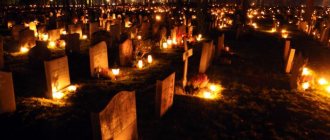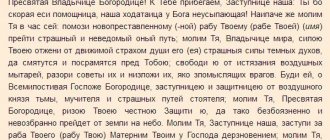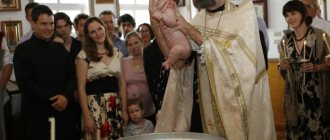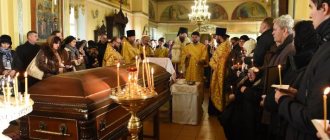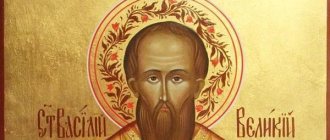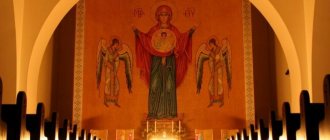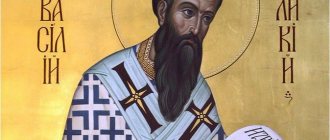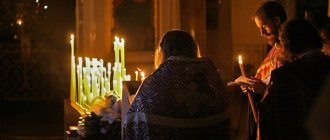Many Christians have at least once wondered: how and to whom to pray for relatives, friends, and acquaintances who died without repentance. This material contains diagrams for reading the canons for those who died without repentance, which an Orthodox Christian can pray. The Old Orthodox, Old Believer tradition knows several names of saints to whom the Lord granted a special right to intercede for those who died without repentance and unrepentant sinners. Among such holy saints of God, the most famous are the Monk Paisius the Great and the martyr Uar.
Canon to St. Paisius the Great
Venerable Paisius the Great.
Fresco, 1547. St. Paisius the Great has deliberate grace to deliver those who died without repentance from eternal torment. The memory takes place on July 2 (NS).
Semipoklonny began. The publican’s prayer “God, you are merciful...” ( 3 bows to the waist, if several people are praying, then these 3 bows are made only by the eldest, namely the one who prays ).
Chant to Jesus: “For the prayers of our holy fathers, Lord Jesus Christ, Son of God, have mercy on me, a sinner (us), Amen” ( bow to the waist ).
Trisagion, and Our Father. “Lord, have mercy” ( 12 times ).
Glory, even now. “Come, let us bow...” ( 3 bows from the waist ).
Psalm 142 “Lord, hear my prayer...”
Glory, even now. “Alleluia...” ( three times, with bows to the waist ).
“Lord, have mercy” ( 12 times ). Glory, even now.
“God is the Lord and has appeared to us, blessed is He who comes in the name of the Lord.”
“Confess to the Lord that He is good, for His mercy endures forever.”
“They cheated me and resisted them in the name of the Lord.”
“I will not die, but I will live and carry on the work of the Lord.”
“The stone, which was not built by God, This was at the head of the corner, This came from the Lord and is wondrous in our eyes” ( and after each verse we say: “God is the Lord...”).
Next, the troparion is read to St. Paisius the Great twice: “With Divine love...”.
Glory, even now (the Mother of God): “Everything is more than meaning...”
Psalm 50 “Have mercy on me, O God...”
“Lord Jesus Christ, Son of God, have mercy on me, a sinner (us), amen” ( bow to the waist ).
Next, the canon itself is read to St. Paisius the Great. The canon consists of 9 songs, the 2nd song is missing. According to the 1st song, the chant is read: “Reverend Father Paisius the Great, pray to God for us” ( bow ). According to the 3rd song of the canon, the sedalene, tone 2 is read: “Binding the soul with the love of Christ...”. Glory, even now, is the Mother of God: “Swift protection...”. According to the 6th pension of the canon, the kontakion is read, tone 2: “Leave worldly rumors...”. Ikos: “Having heard the voice of Christ...” According to the 9th ode, the honorary note is read, in tone 8: “Mistress, accept the prayer of Your servants...” ( bow to the ground ).
Then the Trisagion is read, and the Lord's Prayer. Jesus' prayer. Troparion to St. Paisius the Great twice: “With Divine love...”.
Slava, kontakion: “Leave worldly rumors...” And now, the Mother of God: “Everything is more than meaning...”.
“Lord, have mercy” ( 40 times ). Glory, even now. “The most honorable cherub...” Glory, even now. Lord, have mercy (twice), Lord, bless ( with bows to the waist ). Release: “Lord Jesus Christ the Son of God...”
“Lord, have mercy” (three times). Initial bows.
History of funeral canons
The canons about the dead recognized by the Orthodox Church were written by the Monk Theophan the Confessor, Bishop of Nicea. This can be stated quite accurately, since his name is encrypted in an acrostic poem in one of the canons. The texts created by the monk are inextricably linked and form a single whole. Theophan the Confessor was born in Jerusalem into a Christian family, at the turn of the 8th-9th centuries after the Nativity of Christ. Together with his older brother Theodore, he studied at the Lavra of St. Sava, where both brothers accepted monasticism and the rank of presbyter. The brothers Theodore and Theophanes became famous as champions of icon veneration. More than once they publicly denounced the iconoclast Byzantine emperors, for which they had to endure imprisonment, hunger and severe torment. The Monk Theodore died in prison. Theophan, his brother in flesh and spirit, placed the body of the deceased in a coffin, singing funeral hymns over him - it is believed that this was the beginning of the creation of funeral canons, which were later collected in a book called “Octoechus”. According to legend, the Monk Theophan lived to see the end of the iconoclastic persecution of Orthodoxy, and upon his return from exile he was ordained Bishop of Nicaea. Around 850 the Monk Theophan died; The Orthodox Church celebrates his memory on October 11 (24).
The Monk Theophan was the author of many works and wrote many church hymns: in total he owns about 150 canons in the Octoechos, Menaion and Triodion. The canons about the dead belong to the best creations of St. Theophan; their high dignity is noted by many researchers of church hymnography.
Canon to the Martyr Uar
Martyr Uar.
Fresco in the Athonite monastery of Dionysiates, 1547. Also about people who died in unbelief or heresy, the canon to the martyr Uar is read. There are two canons for him, the second canon is the great one. The martyr Uar is commemorated on November 1 (NS). It should be noted that prayer for people who died in heresy or unbelief is performed privately, at home, outside the church, since during their lives these people did not visit the temple of God. There are cases when people openly fought God or blasphemed during their lifetime. In such cases, you should consult with your spiritual father or another experienced priest about the possibility of commemorating the deceased.
Semipoklonny began. The publican’s prayer “God, you are merciful...” ( 3 bows to the waist, if several people are praying, then these 3 bows are made only by the eldest, namely the one who prays ).
Chant to Jesus: “For the prayers of our holy fathers, Lord Jesus Christ, Son of God, have mercy on me, a sinner (us), Amen” ( bow to the waist ).
Trisagion, and Our Father. “Lord, have mercy” ( 12 times ).
Glory, even now. “Come, let us bow...” ( 3 bows from the waist ).
Psalm 142 “Lord, hear my prayer...”
Glory, even now. “Alleluia...” ( three times, with bows to the waist ).
“Lord, have mercy” ( 12 times ). Glory, even now.
“God is the Lord and has appeared to us, blessed is He who comes in the name of the Lord.”
“Confess to the Lord that He is good, for His mercy endures forever.”
“They cheated me and resisted them in the name of the Lord.”
“I will not die, but I will live and carry on the work of the Lord.”
“The stone, which was not built by God, This was at the head of the corner, This came from the Lord and is wondrous in our eyes” ( and after each verse we say: “God is the Lord...”).
Next, two troparions are read to the martyr Uar: “Thy martyr, Lord Uar...”, “By the army of the holy sufferers of the law...”
Glory, even now (theotokos): “That which has been hidden for centuries...”
Psalm 50 “Have mercy on me, O God...”
“Lord Jesus Christ, Son of God, have mercy on me, a sinner (us), amen” ( bow to the waist ).
Next, the canon itself is read to the martyr Uar. The canon consists of 9 songs, the 2nd song is missing. According to the 1st song, the chant is read: “Holy martyr Uare, pray to God for us” ( bow ). According to the 3rd song of the canon, the sedalene, tone 1 is read: “The martyr saw the honest passion...”. Glory, even now, is the Mother of God: “To the hope of Christians, the Most Holy Virgin...”. According to the 6th pension of the canon, the kontakion is read, tone 4: “Following Christ the martyr Uara...”. Ikos: “Give me singing, my God...” According to the 9th song it reads “It is worthy to eat...” ( bow to the ground ).
Then the Trisagion is read, and the Lord's Prayer. Jesus' prayer. Two troparions to the martyr Uar: “Thy martyr, Lord Uar...”, “By the army of the saints who suffer in the law...”
Glory, kontakion: “Following Christ the martyr Ware...”. And now, the Mother of God: “What has been hidden for centuries...”
“Lord, have mercy” ( 40 times ). Glory, even now. “The most honorable cherub...” Glory, even now. Lord, have mercy (twice), Lord, bless ( with bows to the waist ). Release: “Lord Jesus Christ the Son of God...”
“Lord, have mercy” (three times). Initial bows.
The Great Canon to the Martyr Uar has the same reading pattern as the previous one.
Why do we need a funeral canon?
Prayer is, first of all, an expression of Christian love, the fulfillment of the need to love one’s fellow believers. Since ancient times, it has been customary for Orthodox Christians to pray in remembrance of their deceased coreligionists, since caring for the salvation of the souls of the departed and making requests for them to the Lord God is the little that the living can do for those who have left this world. The Psalter and Akathists are usually read for the departed, Panihidas are served, they are remembered at Proskomedia and Liturgy, and prayer readings of the canons are also organized for their sake. Canons about the deceased are included in most funeral services, since they are very diverse in content and mood, as well as expressive and filled with vivid images. Like the texts of the Psalter, the texts of the canons contain very lively and expressive descriptions of Sacred History, the recollection of which helps those praying for the salvation of the soul of the deceased to more easily endure their grief.
The second reason why the Orthodox Church recommends commemorating the dead with the help of canons lies in the very meaning of the word “canon,” which comes from the Greek word “order.” The canons specify a certain sequence of prayer texts, observance of which is important. The Church teaches that when praying for the repose of the souls of the dead, it is important to know the church rite of remembrance and follow it. For example, the outstanding expert on the Church Charter, Saint Athanasius (Sakharov), wrote about this in his book “On the Commemoration of the Dead according to the Charter of the Orthodox Church,” pointing out the need for obedience to the Church in all spiritual work, especially in prayer. He noted that prayer not according to church rites is dangerous not for the dead for whom we pray, but for us, the praying ones. By acting arbitrarily and rejecting the centuries-old experience of the Church, people, even with good intentions, risk taking the dangerous path of pride and, instead of doing good, causing harm to themselves and others. What is important is that this applies not only to divine services performed in church, but also to prayer at home. Church rites and the succession of prayer works - in particular, the rules of remembrance of the dead, were formed from the prayer experience of the saints. Christians should accept them with humility and love, not as an imposed and alien norm, but as good and easy advice given by the Church.
Song 8.
Irmos: The three youths, who disobeyed the Musikian body and the countless people who worshiped the image in Deir, sang and praised the Lord forever and ever.
God is marvelous in His saints, the God of Israel.
The earthly deeds of the past, the heavenly crowns of the true martyr, crying to You incessantly: sing to the Lord and exalt Him to all ages.
Rest, O Lord, to the souls of Your departed servants.
Having descended into the pit of the underworld, You resurrected those living in the tombs with the life-giving hand and gave Your servants, by faith, peace to those who first fell asleep, Generous.
Glory: Like the source of ever-present life, like this stream of sweetness, Thy servants, piously given to Thee, are worthy to sing and praise Thee throughout the ages.
And now: Mary the Virgin Mother of God, who gave birth bodily to God the Savior, save by faith those who sing Your Nativity, and exalt them unto all ages.
How to correctly read the canons about the dead
The canons about the dead can be read in home prayer by choice and desire at any time, except for the twelve and great holidays, as well as the days of Holy and Bright Weeks. For one deceased one should always read the “canon of one deceased person.” It is read daily in the first forty days after the death of a Christian - during special commemoration, especially on the 3rd, 9th and 40th days. For many deceased, one of the canons about the departed in 8 voices is read, preferably the canon of the current voice (that is, the voice in which the hymns of the Octoechos are sung that week). This canon can be read for all your relatives and loved ones on the eve of Saturday.
October 26, 2021
You might be interested:
- Commemoration
- Funeral service after the funeral
- What to take to the cemetery on Memorial Day
Prayer for the deceased on the day of the funeral - Sgei.ru
| admin|
A deceased person, no more than 40 days have passed since his death, is considered newly deceased. It is believed that for the first 2 days the soul of the deceased is on earth and only on the third day is transferred to heaven, where it will remain until the 40th day. Orthodox prayers for a deceased person help his soul to go through all the airy ordeals, and contribute to the Lord’s forgiveness of earthly sins committed.
Prayer for the newly deceased until 40 days
During the period up to 40 days, prayers for a deceased person should be read, following certain rules. The whole point is that from the day of death the Lord calls His slave to Himself and from that moment a difficult and thorny path begins to determine the place for the soul of the deceased.
The text of the prayer, read over the body of the deceased for up to 3 days
The third day after a person’s death is called thirds. On this day, the soul of the deceased goes to heaven. Therefore, it is very important to offer prayers over the body all three days and after the funeral, so that the soul does not suffer, but receives temporary peace.
Immediately after death, a special ritual of washing and dressing the deceased is performed. After it, loved ones can read a prayer-appeal to the Guardian Angel over the body of the deceased.
It sounds like this:
Prayer for peace after the funeral
Prayer for repose immediately after the funeral is very important, since it is at this moment that the support of living loved ones is very important for the soul. In no case should one treat dead people carelessly, since in this case the Lord will appreciate such an attitude and will not show leniency towards the soul of the deceased at the Last Judgment.
It is believed that after the funeral it is best to read a special prayer in the temple. This is the most powerful prayer. With its help, you can beg for forgiveness of many of the deceased person’s sins that he committed during his lifetime.
The text of the prayer after the funeral is:
Prayer for the 9th day after death
From the third to the ninth day in heaven, the soul of the deceased is shown the tabernacles of paradise. After this, she will have to wander through hell, experiencing various ordeals. To support the soul of the deceased before the expected trials, it is recommended that a funeral be held on that day.
The prayer, which is read on the 9th day after death, sounds like this:
Prayer to the Most Holy Theotokos for the newly deceased
A very strong prayer for the newly deceased is an appeal to the Most Holy Theotokos. During her lifetime, the Most Pure Virgin Mary experienced a lot of grief associated with the loss of loved ones. Therefore, her prayers always calm, but most importantly, such appeals are necessarily taken into account by the Lord when carrying out the Judgment.
Prayer for the repose of the soul of the newly deceased
Until 40 days, the prayer to the Most Holy Theotokos for the newly deceased sounds as follows:
Prayer for the newly deceased after 40 days
After 40 days, you need to pray for the repose of the deceased, turning to the Most Holy Theotokos, on special days, and also when an internal need arises for this. You don't have to visit for this. You can offer a prayer to the Most Pure Virgin Mary at home in front of her image.
The prayer goes like this:
What prayers are customary to read for the dead and why is it necessary?
According to the canons of the Orthodox faith, dead people, if prayers are offered for them for the repose of their souls, receive relief, and sometimes even liberation from God’s punishments from beyond the grave for sins committed during earthly life. Saint John speaks about this in his “Life after Death.”
It sounds something like this:
Commemoration of the newly deceased must be carried out on the 3rd, 9th and 40th day. Wherein:
- On the 3rd day after death, funeral prayers are read in honor of the three-day Resurrection of Jesus Christ and the image of the Holy Trinity.
- On the 9th day after death, prayers are performed in honor of the nine angelic ranks, who are servants of the King of Heaven and petition for pardon of the deceased.
- On the 40th day, according to the tradition of the apostles, the basis for prayer is the forty-day cry of the Israelis about the death of Moses.
After the 40th day, commemorations at the Liturgy are especially strong, which are performed by priests to remember the deceased, believers submit special notes.
It should be understood that there is no specific set number of prayers that guarantee souls entering heaven. The living cannot know anything about God's Judgment.
Therefore, whenever possible, a note should be submitted in the church before the Liturgy.
In addition, memorial prayers are important for the living, since only with their help can the grief of separation from a deceased person be satisfied. During prayer requests, an understanding comes that Christianity does not connect life with the end of everything. It is a transitional stage that God destined for any person to go through.
From the point of view of Christianity, death is a transition to another, more perfect level of life. The soul is immortal, therefore all living people need to see it off to another world not with tears, but with prayer for the repose of the soul. And after her fate is decided at God’s Judgment, it is necessary to support her by periodically reading prayers for her repose on certain days appointed by the Church.
At this time, memorial services are read - public services.
Prayer to the deceased before the funeral
We advise you to read the prayer to the deceased before the funeral with several options in Russian, with a full description and pictures.
Orthodox icons and prayers
Information site about icons, prayers, Orthodox traditions
Prayer for a deceased relative, read at home for up to 40 days
Source: https://sgei.ru/574-molitva-o-usopshem-v-den-pohoron
Song 4.
Irmos: You are my strength, Lord, You are my strength, You are my God, You are my joy, do not leave the bosom of the Father, and visit our poverty. Together with the prophet Habakkuk I call Ti: Glory to Your power, Lover of mankind.
God is marvelous in His saints, the God of Israel.
Yes, O Lord, they will see Your glory, and Your light-giving light will receive light in heaven, having endured every kind of torment, the Divine martyrs, to You, Christ, sing: Glory to Your power, Lover of mankind.
Rest, O Lord, to the souls of Your departed servants.
The many abodes of You, O Savior, are shared in wealth by all, according to the measure of virtues: Thou, O Generous One, fulfill these worthy, even by faith, crying out piously to Thee: Glory to Thy power, O Lover of mankind.
Glory: You appeared as an equal man to us, Immortal, you endured death to all, and you showed the way to life, even when you passed away, you were vouchsafed, as a lover of mankind, forgiveness of sins, as the Lord, bestowing, and granting the sacrament of light.
And now: You are the praise of the faithful, O Blessed One, You are the intercessor and You are the refuge of Christians: a wall and refuge, you bear prayers to Your Son, O All-Immaculate One, and you save from troubles those who lead You through faith and love of the Pure Mother of God.
Song 7.
Irmos: The fathers of Jewry in the furnace, boldly quenching the flame and turning the fire into dew, crying: Blessed are you, O Lord God, forever.
God is marvelous in His saints, the God of Israel.
All the desire of the martyrs stretched out to the one Master, united by His love, and singing: Blessed are you, Lord God, forever.
Rest, O Lord, to the souls of Your departed servants.
Grant by faith the grace of the Divine Kingdom to those who have passed away, granting incorruptible clothing to those who cry: blessed art thou, Lord God, forever.
Glory: Fill Thy servants with joy and gladness, O Generous One, who have made them worthy to cry out to Thee and sing: Blessed art Thou, O Lord God, forever.
And now: Resolving Eve’s oath, Thou didst dwell in the most immaculate Virgin, flowing out a source of blessings crying out: Blessed, Most Pure One, is the Fruit of Thy womb.
Song 1.
Irmos: Having passed through water like dry land, and having escaped the evil of Egypt, the Israeli cried out: Let us drink to our Deliverer and our God.
Chorus: God is marvelous in His saints, the God of Israel (bow).
By the death of Christ, and by imitating the honest Passion, all the martyrs received Divine and blessed lives.
Rest, O Lord, to the souls of your departed servants (bow)1.
Having despised the sins of youth and surpassed the sins, O Christ the Savior, Thy servants before the repose were brought into line with Thy chosen ones.
Glory: Having already received the glory and joy that you have acquired the blessed stay, grant richly to Your servant, which You have received, O Most Merciful One.
And now: Thou hast conceived the Word of the Father, united in flesh according to hypostasis, Who from Thee, the all-immaculate Maiden, abolished hell by Divine power.
